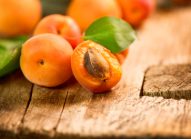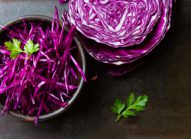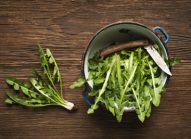- Beta-carotene is a precursor to vitamin A.
- It turns into vitamin A according to the body’s needs.
- It is only present in the plant kingdom.
- Vitamin A is also important for night vision.
- Beta-carotene is a powerful antioxidant.
- The body can absorb it better after it is cooked in fat.
Why should we
eat some daily?
Vitamin A is indispensable at every stage of life! It should be consumed daily in the form of active vitamin A (retinol), available only in animal products (meat, fish, dairy, etc.), and beta-carotene or provitamin A, found in plants.
Beta-carotene is transformed into vitamin A by the liver, according to the body’s needs. It is the most powerful precursor to vitamin A, followed by alpha-carotene and beta-cryptoxanthin, other carotenoids.
It is time to think about yourself! And why not enjoy delicious dishes, which are not only healthy and balanced but also protect the l’environmnement? In this article, you will learn how to concile your food with its environmental impact.
What are the roles of
vitamin A and beta-carotene?
The main role of vitamin A is related to vision, including night vision. However, it also intervenes in various functions of the body including growth, tissue regeneration (skin, intestinal mucous membranes), and immunity. What’s more, it helps scars form and protects the skin from external aggressions, such as the sun’s rays.
In addition to the properties of vitamin A, beta-carotene can act as an antioxidant. This property is associated with a reduced risk of bladder, mouth, larynx, respiratory tract, breast, and esophageal cancer, and probably colon cancer as well.
What is the
recommended intake?
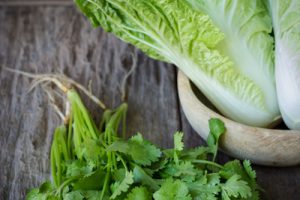
Where is it
found?
Beta-carotene, or provitamin A, is exclusively found in plant-based foods, with the exception of eggs and butter.
Did you now that around one third of food produced globally is wastedmondiale ? Say NO to plant-based waste! This article gives you 7 tips to avoid it.
Beta-carotene
content in foods
| Beta-carotene content in foods | mg/100 g |
| Sorrel | 11 |
| Turnips | 7 |
| Chervil | 6,2 |
| Carotts | 6 |
| Dandelion greens | 6 |
| Spinach | 5,5 |
| Parsley | 5 |
| Apricots | 4 |
| Nectarines | 2 |
| Egg yolk | 2 |
| Escarole | 2 |
| Chicory | 1,8 |
| Red cabbage | 1,5 |
| Dried peach | 1,2 |
| Lettuce | 1 |
| Whole egg | 0,6 |
| Butter | 0,5 |
| Source: Ciqual |
Myths about
beta-carotene
You can take high-dose beta-carotene supplements…Nothing could be further from the truth! The World Cancer Research Fund has convincingly demonstrated that the daily use of a beta-carotene supplement increases lung cancer risk in smokers and subjects exposed to asbestos. As a precaution, it is therefore better to take in beta-carotene through food.
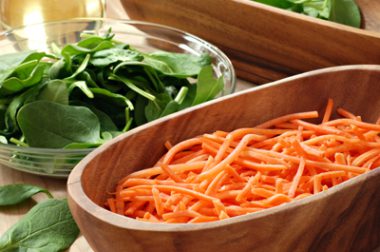
What are
its particularities?
When you prepare vegetables rich in beta-carotene, like carrots, always use a bit of oil, butter, or margarine to help you absorb this fat-soluble provitamin.
What if I eat
too much or too little?
A decrease in visual acuity, especially in night vision, is one of the first noticeable signs of a vitamin A deficiency in humans. A severe deficiency can result in irreversible blindness. If the deficiency lasts, it can even become fatal. Generally, vitamin A deficiency symptoms also include pale, dry skin, development of conjunctivitis, hypersensitivity to infection, slowing of growth, and reproductive issues.
Some people may be at a higher risk for provitamin A deficiency, including: pregnant women; smokers; elderly people; chronic alcoholics; people with cancer, AIDS, diabetes, and allergies; people exposed to the sun; and people sensitive to skin disorders.
Unlike an excess of vitamin A, a precursor excess is not toxic, causing only yellow skin, which is reversible and not dangerous. Provitamin A only turns into vitamin A according to the body’s needs. Furthermore, as the body does not absorb it fully, there is no real risk of overdose.
Vitamin A excesses can be toxic, but this is a very rare situation. However, it is wise to be careful during pregnancy. An excess of vitamin A is associated with birth defects. That is why it is not recommended for pregnant women to consume liver (the food highest in vitamin A). However, beta-carotene intake through food presents no danger.



 Sorrel
Sorrel  Chickpeas
Chickpeas  Vegetable garden: growing avocado
Vegetable garden: growing avocado 










